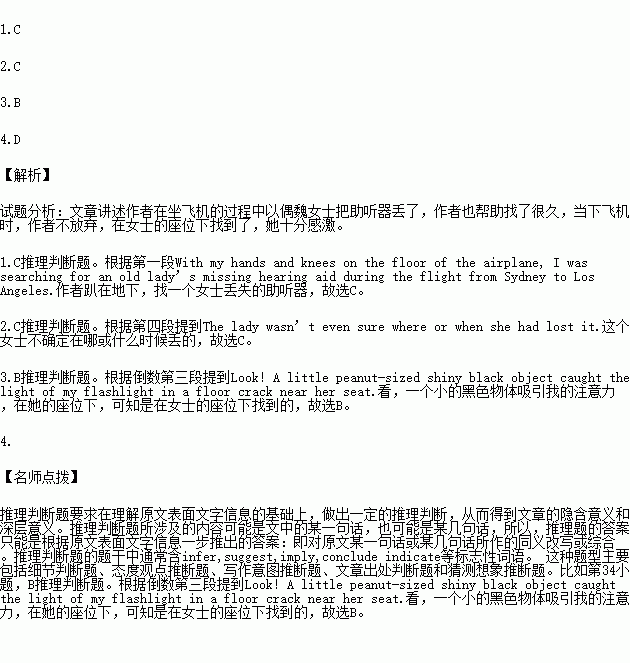题目内容
With my hands and knees on the floor of the airplane, I was searching for an old lady’s missing hearing aid during the flight from Sydney to Los Angeles. It occurred to me that this may not be the most dignified posture for a Buddhist nun(尼姑).
I had seen the old lady from the seat in front of me as she walked up and down the passage with a flashlight. I asked a few times what was wrong, but she didn’t answer at first —– she couldn’t hear me. She was wearing a woolen coat. Judging from her accent, she came from Eastern Europe.
Do you know how much hearing aids cost? Thousands, especially for the new tiny hidden-in-the-ear type she described. It takes a long time for an appointment to make a new one, and many doctor visits to get the thing adjusted right. Therefore, my dignity seemed less important than finding that hearing aid. But how does one find a tiny black object in a shadowy jet cabin(机舱)
The lady wasn’t even sure where or when she had lost it. At one point, a couple of flight attendants did a random search around the lady’s seat; I wasn’t impressed. They left suggesting that she search the seat of her previous flight! My flashlight turned up all kinds of small objects, bits of plastic, broken pieces of headphones.
The old lady said that she gave up. Yet I couldn’t. After we landed, as passengers streamed past us, I insisted that the lady move aside while awaiting her wheelchair. Then I got into a real down and dirty search among the dust under her seat and on the floor.
Look! A little peanut-sized shiny black object caught the light of my flashlight in a floor crack near her seat.
What a rush. “I found it!”
With great astonishment and gratitude, the old lady responded, “I haven’t the words to express my thanks!”
1.Why did the author put her hands and knees on the floor?
A. She is a religious Buddhist nun.
B. She fell down from her seat.
C. She helped the old lady look for her hearing aid.
D. She wanted to stand out among the passengers.
2.What do we know about the old lady?
A. She ignored the author’s question on purpose.
B. She is an American.
C. She lost her hearing aid by accident.
D. It was not difficult for her to get the hearing aid at all.
3.Where was the hearing aid found?
A. On the previous flight.
B. Close to the old lady’ seat.
C. On the wheelchair.
D. In another jet cabin.
4.According to the last two paragraphs, what is the old lady’s attitude towards the author?
A. Respectful. B. Doubtful.
C. Supportive. D. Grateful.
 天天练口算系列答案
天天练口算系列答案
